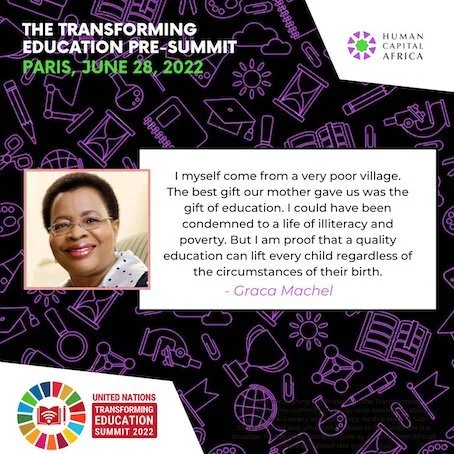Schooling must guarantee learning
Despite the fact that more children have access to school, 9 out of 10 ten-year-olds in low-income countries are not able to read and understand a simple story.
Basic literacy and numeracy are the foundation of all learning and schooling must guarantee children these skills.
The UN Transforming Education Summit in September 2022 must prioritize foundational learning. Progress is impossible if millions of children never learn to read or count.
Political commitment, increased investment in education and implementation of evidence-based approaches for rapid improvements in children’s learning outcomes are urgently required.
A learning crisis
Over the past two decades, significant progress has been achieved in providing education to millions worldwide. Numerous global initiatives, significant increases in donor funding, and collaboration between developed and developing nations have enabled children to enter school for the first time.
Despite this, there is currently a global learning crisis, which is hitting the poorest, most marginalized children, particularly hard, and has been exacerbated by the COVID-19 pandemic. 70 percent of children in low- and middle-income countries cannot read and understand a simple story by the end of primary school. In Sub-Saharan Africa countries, the level is as high as 90 percent.
This is a clear warning sign that SDG 4 which commits to ensuring that, by 2030, “all girls and boys complete free, equitable and quality primary and secondary education,” is in jeopardy.
To transform education we must prioritise foundational learning
The UN Transforming Education Summit which takes place in September is being convened by the Secretary General to mobilise greater political ambition, commitment, and action to reverse the slide on SDG 4.
Foundational skills in reading and math must be a priority for the Summit. Children who fail to master them are at the greatest risk of long-term learning deficits, with a significant impact on their future life chances.
“Political and educational leaders should make it clear that foundational skills are a priority, and articulate clear, achievable goals to reinforce this point. If we can’t commit to providing children with these basic skills then it’s impossible to imagine achieving our other goals,” said IPNEd Executive Director, Joseph Nhan-O’Reilly.
Parliamentarians have a vital role to play in ensuring that their governments priortise foundational learning, including by advocating for three essential measures.
What is required for transformation
1. Close the education financing gap
Globally education remains chronically underfunded. The costs of underfunding education - compounded by the inequitable and inefficient allocation and expenditure of resources - are catastrophic. It drives low enrollment and completion rates, poor learning outcomes and household spending on education.
If we are to have any chance of accelerating education progress, the Transforming Education Summit must drive a new global effort to close the education financing gap. This requires significantly increased financial resources for education alongside better targeted spending, greater efficiency and increased accountability.
Governments should also prioritize investments in cost effective interventions which improve learning.
2. Assess learning levels
To tackle the learning crisis, countries must first address the learning data crisis, by assessing students’ learning levels.
Understanding children’s current learning levels will better direct their learning recovery journey. As students return to school following the closure of schools because of COVID-19, assessing their learning levels is paramount to accelerate learning recovery.
It is critical for policymakers, school administrators, and teachers to have access to learning data that reflect their context, and for learning data to be disaggregated by various sub-groups of students, so that they can target instruction and accelerate students’ learning recovery.
Parliamentarians should ensure that their countries measure learning and are acting on the results.
3. Ensure teachers are prepared to teach reading and maths
Teachers are central to any successful effort to improve literacy outcomes. However, in many low-income countries across the world, pre-service and inservice training does not include explicit instruction on reading and math.
To improve the quality of teaching and ensure children learn to read and do maths, parliamentarians should ensure that their governments are adequately preparing teachers, motivating and supporting teachers, and strengthening school leadership and management.
What’s next?
“It is absolutely clear that without urgent action to reduce learning poverty, we face a learning and human capital catastrophe. But at every level we haven’t yet faced up to the extent of this challenge,” said Nhan-O’Reilly.
Given this, as a vital first step the Transforming Education Summit must help the world to understand the current crisis in foundational learning, accept and understand the magnitude of the challenge, and commit to resolving it.


